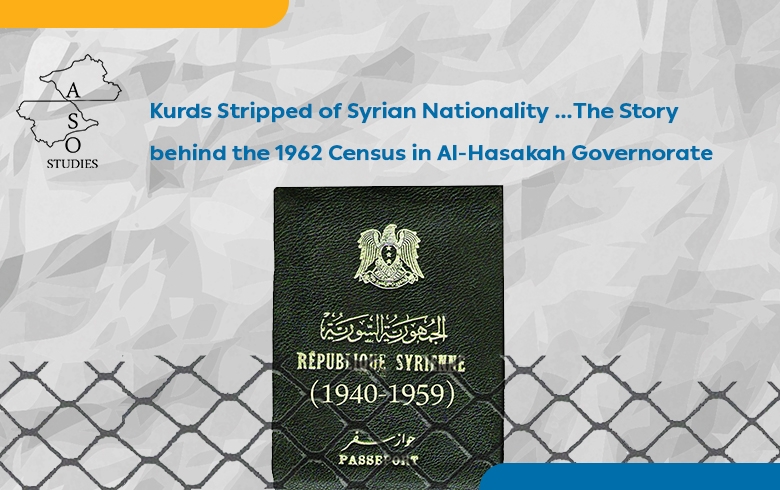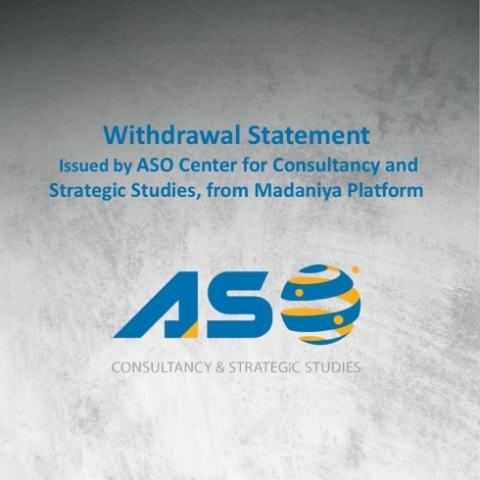

Kurds Stripped of Syrian Nationality ...The Story behind the 1962 Census in Al-Hasakah Governorate
2021-07-24
ASO Center for Studies
Historical Background:
After the fall of the Ottoman Empire in 1922, Syria had come under the tutelage of the French Mandate, which has concluded with Turkey and Britain a set of agreements, among which was the division of areas of influence between them at the expense of the landholders. Therefore, the border between Syria and Turkey has been volatile for 15 years. It remained unstable until 1939, after the adoption of the Baghdad-Istanbul railway, as a dividing line between Syria and Turkey.
Prior to these dates, Ottoman nationality was the official document of sponsors of Ottoman-occupied states. This was followed by the emergence of laws organizing the legal status of Syrian sponsors who were mandated by the French authorities that adopted the spatial principle as a criterion for obtaining Nationality. Kurdish families and tribes separated by forced borders, drawn up by foreign countries, are now organized according to the nationality of the new states due to the unjustly-dissolve of the Ottoman Empire. Thus, those who had Ottoman nationality and Ottoman real estate documents, whose territory was within the new borders of Syria, became a Syrian citizen, and was stripped from the Ottoman nationality.
The civil status and nationality in Kurdish areas in NES (Northern and Eastern Syria) have been addressed in this manner. With regard to the Kurdish population density in the border areas between Syria and Turkey, Mohammed Kurd Ali called on the Syrian government to make a demographic change in the Kurdish areas, to relocate Kurds and distribute them over other Syrian cities, in order to avoid the independence of Syrian Kurdistan. As the Baath Party came to power in Syria, it sent a security officer to Al-Hasakah governorate, who reported the social and economic situation there, demanding the denationalization of Kurds and an extermination of the Kurdish cultural identity.
What is the Census in Al-Hasakah Governorate?
On August 23rd, 1962, the President of the Syrian Republic, Nazim al-Qudsi, issued the Legislative Decree No. 93, which stipulates an exceptional census in Al-Hasakah governorate. The Decree relied on the Legislative Decree No. 1 dated April 30th, 1962, and on the decision by the Prime Minister, Bashir al-Azma, dated August 22nd, 1962.
The census, later known as the "Al-Hasakah Census 1962", included:
A general census is to be carried out in Al-Hasakah province in one single day. The exact date will be more closely determined by an order from the Ministry of Planning, at the recommendation of the Interior Minister.
Upon the end of the population census, a Supreme Committee shall be formed by a Republican Decree based on the proposal of the Minister of Interior to study the results of the census, decide whether or not to confirm them in the new civil registrars, and prepare instructions for that
The census was conducted in Al-Hasakah governorate on October 5, 1962, and resulted in the division of Kurds in the governorate into three main categories at law:
• Kurds enjoying the Syrian nationality (this group was able to obtain Syrian nationality through the census).
• Kurds deprived of citizenship, registered in the official records as foreigners. (This group has been confirmed in official records as foreigners living on Syrian territory).
• Kurds deprived of citizenship, unregistered in the civil status official records and referred to as Maktoum al-Qayd (Unregistered). (This group has been described as Identity-Document Deprived, a term indicating that there is no reference to the person involved in the official records, and it includes those born to a foreign father and a citizen mother, those born to a foreign father and a Maktoum al-Qayd mother and those born to a Maktoum al-Qayd parents).
At that time, the Syrian government set only one day for the census to be conducted, and Kurds had to prove that they had lived in Syria since at least 1945. The Syrian regime stripped Kurds of their nationality on the pretext that they were of Turkish origins and migrated to Syria following the Kurdish revolutions in Turkey during the 1920s. However, the law was aimed at stripping Kurds of Syrian nationality and reducing Kurdish population density in Al-Hasakah governorate. In fact, all the residents in the governorate had been living there since the 1930s, before the Upper Jazeera became a part of Syria, and even members of the same Kurdish family were divided between naturalized and foreigners. For example, one of the results of the census was the denationalization of well-known Syrian Kurdish figures such as, Tawfiq Nizam Eddin, a former Syrian Army Commander, and his brother Abdel Baky Nizam Eddin, who held several Ministerial positions between 1949 and 1957. It is worth noting that Nizam Eddin family owns most of Qamishlo city in Al-Hasakah Governorate and until now, families living in Qamishlo need a waiver from Nizam Eddin family to transfer home ownership to their name. Moreover, the law violates the laws of the French Mandate and the Treaty of Lausanne.
In 1923, the Treaty of Lausanne established new laws regarding the nationality of the new states it had created, including Syria, as the treaty had drafted three legislations in that regard, including the regulation of procedures for granting new Syrian nationality on the basis of residence. Article 30 of the Treaty says:
"Every Turkish citizen living on the territory of the new States, which were separated from Turkey under this Treaty, shall be granted the nationality of the country in which he/she lives; therefore, anyone who lived on Syrian territory has become a Syrian citizen."
While in 1924, the French High Commissioner issued Decree No. 2825, which elaborated on the transmission from the Ottoman to the Syrian nationality and identified three cases in which an individual obtains Syrian nationality, stating:
"Every person of Turkish origin, any person of Turkish origin and living in Syria on the 31 August 1924 is from now on considered to be Syrian and loses their Turkish citizenship. People of Turkish nationality, of Syrian origins and living abroad on the 31 August 1924 could request the Syrian citizenship. He also gave the women the right to obtain the nationality of her Syrian husband."
What are the results of the Census?
1. Statistics of those denationalized and Identity-Document Deprived:
• The number of Syrian Kurdish foreigners in Al-Hasakah governorate, registered in the Directorate of Records in Al-Hasakah governorate was 242,346 Kurds until 2011.
• The number of the identity-document deprived in Al-Hasakah governorate, from Syrian Kurds in the Directorate of Records in Al-Hasakah governorate, was 300.171 Kurds.
According to these results, the number of Syrian Kurds denationalized and those deprived of identity-document in Al-Hasakah governorate exceeded more than half a million Kurds. The number does not include Syrian Kurds immigrants and expatriates in European countries, who have not registered their children in the records of the Syrian state, and it also does not include Syrian Kurds who had moved to Turkey and obtained Turkish nationality and had not registered their children in the records of the Syrian state.
2. Loss of Civil Rights:
One of the most prominent problems facing denationalized Syrian Kurds, who did not leave Syria as a result of this measure, was the loss of all their civil rights in Syria.
• A foreigner and an identity-document deprived person of Syrian Kurds are not eligible to run for any Syrian position, nor are they eligible to vote.
• A foreigner and the identity-document deprived are not entitled to form political parties and engage in political action.
• A foreigner and the identity-document deprived are not entitled to a permanent job in the public sector.
• A foreigner and the identity-document deprived are not entitled to own a property or register any vehicle or car.
• The foreigner and the identity-document deprived are entitled to study in state and private schools, and are entitled to enroll in university, but do not obtain a university degree and are not employed.
• The foreigner and identity-document deprived are not entitled to obtain ration cards issued by the Syrian government.
• The foreigner and the identity-document deprived suffer from strict travel restrictions inside and outside the country, and are allowed to leave Syria after obtaining exclusive approval from the Minister of Interior, with a one-time exist document.
• Syrian women cannot grant their nationality to their identity-document deprived husband and children, while Syrian men can grant their nationality to their foreign or the identity-document deprived wife.
• The identity-document deprived and foreigners are granted identification documents of their own, issued by the mayor of locality.
2011 Naturalization Law:
In March 2011, popular protests against the Syrian regime began, and protests were then demanding a set of constitutional and political reforms. At that time, the President of the Syrian Regime, Bashar al-Assad, issued a legislative decree No. 49 on 7 April 2011, under the title: "Granting Syrian Arab Nationality to those registered as foreigners in al-Hasakah." Most indications were that the purpose of the decree was to neutralize Syrian Kurds from participating in popular protests.
The Legislative Decree contained three Articles, which were as follows:
Article 1: Individuals who are registered as foreigners in Al-Hasakah Governorate shall be granted Syrian nationality
Article 2: The Minister of the Interior shall issue the decisions containing the executive instructions to this decree.
Article 3: This decree shall be effective from the date of publishing in the Official Gazette.
On 13 July 2011, the Assistant Minister of Interior for Civil Affairs, Brigadier General Hasan Jalali, stated that the Civil Registry Offices had received 37,904 applications for Syrian nationality to date. He added that 21,993 identity cards had been granted so far.
Until 2018, 326,489 Syrian Kurds had Syrian nationality, with 19,753 foreign Kurds remaining, while, 50,400 Syrian Kurds, from the identity-document deprived category, obtained Syrian nationality after correcting their legal status from an identity-document deprived to a foreigner and then to a citizen. According to rights reports, 41,000 persons of this category remained without obtaining the nationality for not correcting their legal status.
The Syrian regime has distinguished the personal ID cards of foreign and identity-document deprived citizens of Al-Hasakah governorate with special codes, as the number 8 was placed after the registration number, as follows: ××/8, which puts the possibility for the regime to withdraw nationality again from them, in case it regains its strength.
The Syrian regime has not opened any nationality center in its embassies and consulates in European countries, in the KRG or in Turkey, and has not organized any electronic operation, which contributes to the acquisition of Syrian Kurds, deprived of nationality, and long-standing immigrants abroad.
Sources and References
1) Syrians for Truth and Justice, "Syrian Citizenship Disappeared”: How the 1962 Census Destroyed Stateless Kurds’ Lives and Identities
https://stj-sy.org/ar/746/
2) Himbarvan Kosse, "Those identity-document deprived: Syrian Kurds as Foreigners in Their Country", Lebanese Daraj website, 2018.
https://daraj.com/10523/
3) Haitham Manaa, Stateless Persons in Syria (Non-Palestinian Refugees), Arab Commission for Human Rights, 2004. https://2u.pw/FAvxJ
4) Al Jazeera Net, 1962 Al-Hasakah Census, 2011. https://2u.pw/wQwlK

